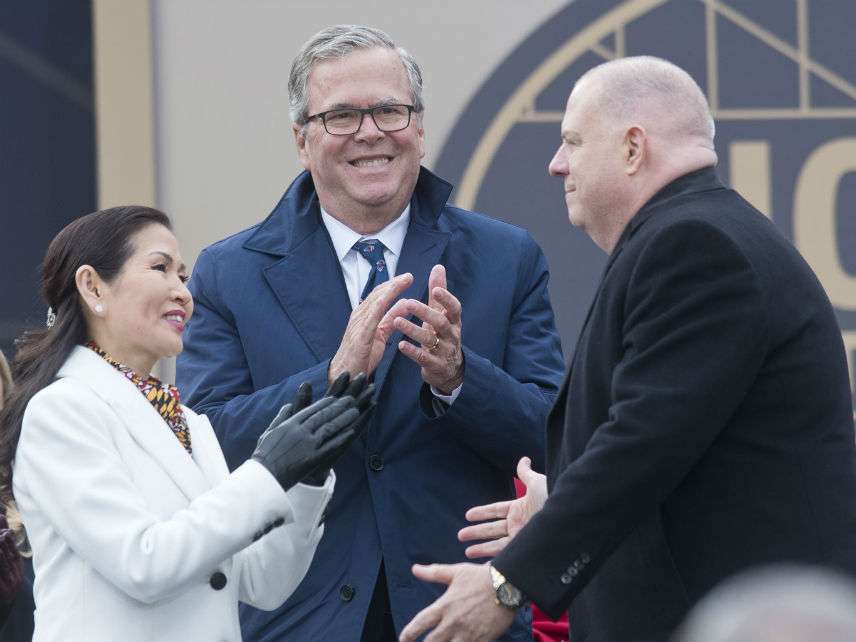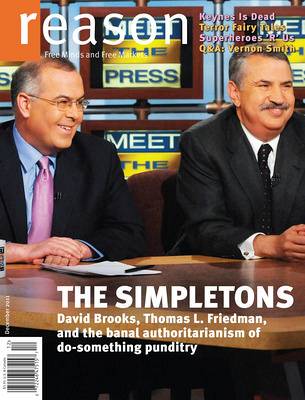Jeb Bush Conservatism Finds a #NeverTrump Outlet in 'Problem-Solving' Larry Hogan
Bush, Chris Christie, Bill Kristol, and a bunch of op-ed interventionists stoke 2020 speculation around the Republican governor of Democratic Maryland.

So far the #NeverTrump presidential pre-primary season has had precious little raw material to work with. Sure, John Kasich is out there "very seriously considering" a run while fundraising off his new paid CNN gig, but the former Ohio governor's dollar amounts have been lackluster so far. Former Arizona Sen. Jeff Flake doesn't seem enthused about competing, Sen. Mitt Romney (R–Utah) has flatly ruled it out, and former Defense Secretary Jim Mattis is mostly just a gleam in neoconservatives' eyes.
Pickins are so slim that The Bulwark, that post–Weekly Standard Bill Kristol publication and go-to source for 2020 GOP primary fanfic, has been reduced to writing open letters pleading for candidates to step "unto the breach." (Portentous sales pitch: "The time is now. The game is afoot. Follow your spirit, and upon this charge, who knows? Maybe when all is said and done you'll be 46.")
So it's no wonder that Larry Hogan is having a bit of a moment. The popular and recently re-elected Republican governor of Democratic Maryland delivered a second inaugural address Wednesday that was long enough on national/presidential themes that it spawned big articles in Politico and Buzfeed News, plus speculation in National Review, Vanity Fair, and (of course!) The Bulwark.
"Although Hogan doesn't have much of a national profile, it's less of a stretch than you might think," The Bulwark's Andrew Egger insisted. "Hogan's constituency isn't made up primarily of Trump fans….In other words, Hogan doesn't stand to lose much politically by taking on the president." He may be a relative unknown, but at least he doesn't have much of a future!
Hogan's potential run, like all pondered Republican challenges to Trump, is interesting in what it says about the values, attributes, and philosophies of an imagined post-Trump conservatism. Pushed by perennial politician-whisperer Bill Kristol as well as the ex-libertarian post-ideologues at the Niskanen Center, assisted at his second inaugural by Jeb Bush and former John McCain alter-ego Mark Salter, and boosted by Trump turncoat Chris Christie, Hogan's candidacy invites us to ask what these seemingly disparate strands of dissident Republicanism hold in common.
Judging by his big speech, the answer is a whole lot of "civility" and "moderation" and "bipartisan, commonsense solutions," and very little on the specific content of, or philosophical approach toward, actual policies.
As prepared for delivery, there are 11 combined paragraphs in Hogan's second inaugural dedicated to George H.W. Bush and John McCain ("As we look back on the lives of these leaders, it makes us yearn for something better and more noble than the politics of today"), seven understandably proud paragraphs about how his late father was the first GOP member of the House Judiciary Committee to call for Richard Nixon's impeachment ("'No man, not even the president of the United States, is above the law,'" he quoted Larry Hogan, Sr., as saying), and all of six terse sentences that mention any specific achievements. "We faced our fiscal challenges with steady resolve and eased the tax burden….We funded education at historic levels," etc.
The real gooey center of the speech, and presumably Hogan's national selling proposition, is just paragraph after paragraph of problem-solving centrist moderation. A slice:
Four years ago, I committed to usher in a new era of bipartisan cooperation and prosperity in Maryland, one filled with hope and optimism.
I pledged to govern with civility and moderation, to avoid attempts to drive us to the extremes of either political party, and to uphold the virtues that are the basis of Maryland's history as "a state of middle temperament."
I believe it's because we kept that promise to put problem-solving ahead of partisanship and compromise ahead of conflict that I'm standing here again today….
Let's repudiate the debilitating politics practiced elsewhere—including just down the road in Washington—where insults substitute for debate, recriminations for negotiation, and gridlock for compromise; where the heat, finger-pointing and rancor suffocates the light, and the only result is divisiveness and dysfunction.
Hogan ended with a call for a government "that tolerates contrary views among a diverse citizenry without making them into enemies or doubting their patriotism," that "can discuss and debate with as much civility as passion and with a view to persuade, not intimidate, to encourage, not demonize or defeat," and so forth.
You can see the attraction of pragmatic, non-divisive civility in an American political nerve system rubbed almost intolerably raw by the incivil passions stirred up by both President Donald Trump and his fiercest critics. I for one would prefer a president who wasn't (in the recent words of George Will) "incessantly splentic," "almost inexpressibly sad," and a "fountain of self-refuting boasts."

But there's more to the presidency than personal comportment, and more questions about the future of conservatism than whether it will be nice or mean. George H.W. Bush seemed like an affable fellow, and he managed the end of the Cold War with prudence, but he approved a tax increase without commensurate spending cuts and led the country into an ill-thought war. John McCain served his country with honor and taught us important lessons about torture, but he was the single biggest military interventionist on Capitol Hill.
One key area where Donald Trump sometimes challenges Republican orthodoxy—and drives the #NeverTrump right into apoplexy—is on foreign wars, occupations, and deployments. Where does Hogan stand on this critical, presidentially latitudinous issue? He isn't really saying yet, nor are his interventionist op-ed boosters, such as The Washington Post's Jennifer Rubin and The New York Times' Bret Stephens. But Hogan's ally Jeb Bush, for one, was making the playground argument as recently as 2016 that, "The next president of the United States is gonna have to get the United States back in the game, and if a preemptive strike is necessary to keep us safe, then we should do it."
If post-Trump conversativism doesn't grapple with its own pre-Trump mistakes, then it's hard to see what the value proposition is for those of us who wouldn't be on the hiring shortlist for the Hogan administration. I presume that he, like his boosters, would be more traditionally pro-trade, and that he wouldn't base as much of politics and policy on the negative collective demonization of disfavored groups based on their immutable characteristics. But even there, I would hesitate before pronouncing Hogan & Co. significantly better on immigration. As I pointed out last month, while the Maryland governor is "a critic of Trump's family-separation policy and talks like a comprehensive immigration reformer…he has also bashed sanctuary policies and balked at Syrian refugees." His fan club ain't Trump, but funny things happen to even the most immigration-friendly of Republicans when they have to face GOP primary voters—Jeb Bush starts playing the "anchor baby" card, Chris Christie proposes treating legal immigrants like FedEx packages, John McCain suddenly wants to complete the danged fence.
Trump rocketed to popularity in part because he convinced grassroots conservatives that he, unlike the GOP establishment, actually meant what he said about doing whatever it takes to restrict both legal and illegal immigration. Regardless of who steps unto the breach, I'm waiting to hear more self-reflection from those who made a living for so long pandering insincerely to a base they not-so-secretly loathe.
Will Trump's challengers be as aggressive as he in slowing the growth of regulation? Hogan did brag in his 120-word section on tangible accomplishments about "clear[ing] away the tangle of regulatory undergrowth," so maybe, but the last time the #NeverTrump crowd had sway in a Republican administration, they contributed to the biggest regulatory ramp-up since Richard Nixon.
And will our tanned, rested, and ready GOP dissidents come back to power with as much heretofore unseen enthusiasm for criminal justice reform? Recall that the leading Senate opponent to the First Step Act, the odious Tom Cotton, was not so long ago a protégé of Bill Kristol.
I sincerely look forward to some vigorous political competition for 2020, whether inside the GOP, among independents, or in third parties. It is entirely possible that, given the rancor and dysfunction in Washington, there's at least some market for common-sense, bipartisan problem-solving featuring candidates who come across as functioning adults instead of outer-borough towel-snappers. But this would not be the first time we were sold the fiction that do-something politics is somehow non-ideological. The longer Larry Hogan's slate remains blank, the more we should treat it with skepticism.


Show Comments (71)